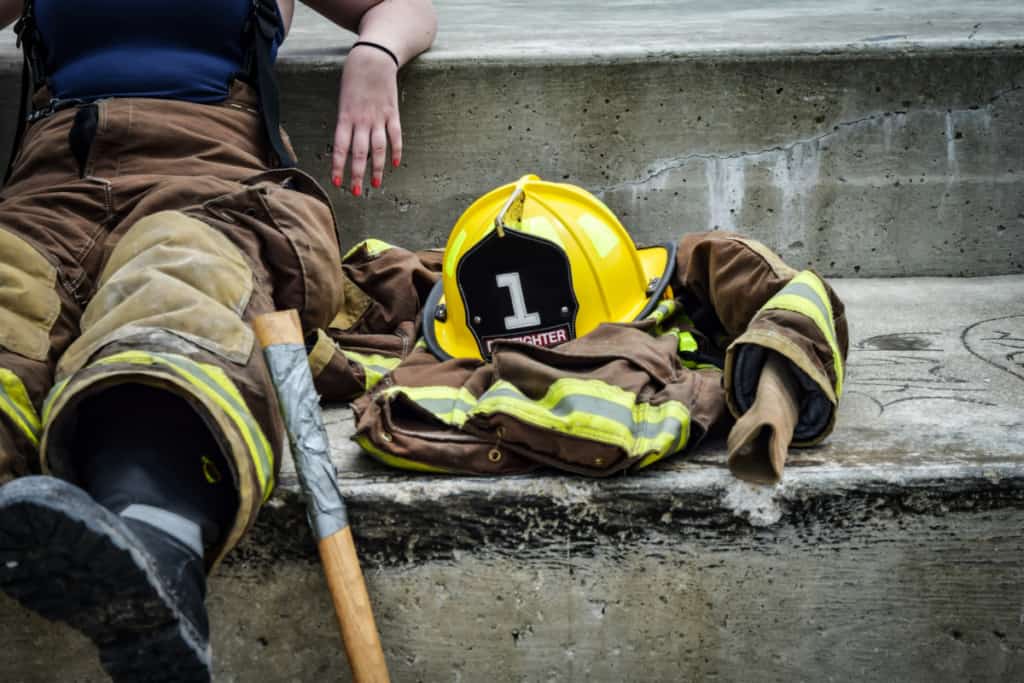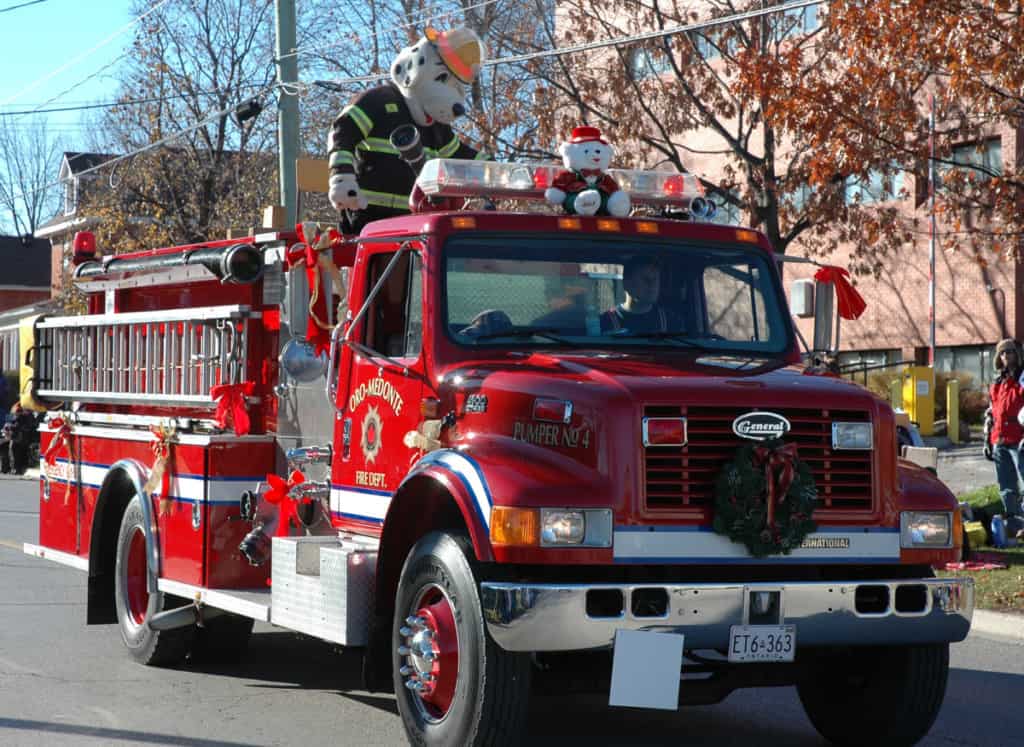So, you’ve decided you want to be a firefighter and have completed the minimum requirements for the job. Now, it’s time to start applying for positions to secure yourself a job as a firefighter. The best way to do that is by nailing the application process the first time.
Attention to detail and professionalism are key here. That means:
- Be sure to use spell-check and double-check the accuracy of your application, resume and cover letter.
- Including all relevant information (education, experience, certifications) that shows you’re a qualified candidate.
- Demonstrating the qualities of the ideal firefighter.
A good resume and application have the ability to help you lock down a job and start your career as a firefighter in no time! First, we’re going to go over why this part of the job process is actually so important.
Your # 1 priority is keeping your family safe. As a firefighter, I recommend everyone has updated smoke detectors that don’t require battery changes, like these ones from Kidde, a fire extinguisher, like this one from Amerex, and a fire escape ladder if you have bedrooms above the first floor, I recommend this one from Hausse.
For more information on the firefighter hiring process, read: How to Become a Firefighter: The Complete Guide
Making a Good First Impression
You might be confident that you can knock out a job interview and make a good first impression with no problem. Yet, that skill isn’t too useful if you can’t even secure yourself a job interview in the first place.
Your job application and resume are your future employer’s first official look at who you are and what you’re capable of. That means you need to convince them that you’re qualified enough to even get an interview.
Many people make the mistake of not taking this step seriously. While the application can seem like a trivial step, good candidates get disqualified or start with a bad impression due to not properly completing this step.
How You Portray Yourself
Think about what makes a person a “good” firefighter. You probably immediately thought about the ability to put out fires, respond to emergencies, and perform daily tasks around the station.
Yet, there’s a lot more to being a firefighter than actually being able to do the job itself. Fire chiefs want their firefighters to be:
- Have integrity and strong values (moral compass)
- Professional and a good representation of the fire department
- Compassionate and caring
- Driven and motivated
- Able to focus on the small details
- Pick up new skills quickly
- Physically and mentally fit for the job
Though most of these are best shown during an in-person interview, you can also demonstrate these skills and characteristics in your firefighter application.
The Benefits of a Great Application
So, what’s the point of an application in the first place? Well, think about how many potential firefighters there are out there. Many firefighter jobs have thousands of applicants for a handful of positions.
There’s no way that a fire chief and his staff can interview all of them. Plus, there’s really no need to interview candidates that aren’t even qualified for the job.
The application process is the perfect way to show your future employer that you’re a good fit for their department. It’s also the best way for your future employer to weed out the candidates that don’t belong to their department.
A good application is the best way to get yourself a job interview and give the fire chief a good first impression before you even officially meet for the interview.
Here is a great video that talks about how you can be disqualified by not filling out the firefighter job application correctly and how to avoid those mistakes:
How to Best Fill Out the Application
The actual application process is usually pretty straightforward. All it really requires is the submission of an application and resume. Then, you anxiously wait to see if you get a call back for the next step on the hiring process (usually the written test or oral interview).
Yet, it’s not as easy you might think. Filling out the application requires a ton of attention to detail and a lot of focus on remaining professional. We’re going to reveal seven tips that you can use right now when you’re filling out your first firefighter application!
1. Be Thorough.
When you’re applying for a job as a firefighter, attention to detail will be something that sets you apart from the other candidates. That means it’s really important that you’re thorough when completing the application process. The application is also a test of your ability to follow instructions.
When you’re applying for a job with a specific fire department, check their website or firefighter job website to learn about what they need from you during the application process.
Make sure you’re following every single step and giving your potential future employer everything they need to see that you’re the best candidate out there. Skipping even one step could send your entire application into the recycling bin.
Here’s what you can do to make sure you’re thorough during this process.
- Follow the application step-by-step and read every single word that’s typed (don’t skim it!).
- Don’t initial or sign anything until you’re completely sure of what you’re signing and that your information is correct.
- Review the application checklist (which might actually be on the final page of your application) and make sure that you’ve completed all of the necessary steps.
Also, make sure that you’re attaching your cover letter and resume to your application so that the fire chief has everything he needs to learn all he needs to know about you.
2. Double-Check Your Information.
When we say double-check your information, we really mean triple or quadruple-check it. This might very well be the application that sets you apart from other candidates and secures you a job with your dream department. So, pay attention and make sure you’re covering all of your bases.
Here’s what you can do in the process of double-checking your information.
- Use spell-check. The first thing you should be doing before you submit your application is running your entire application (resume and all) through a spell-check system. But, as useful as these add-ons can be, they aren’t always right. Look over what the spelling or grammar suggestions are before officially changing them.
- Check your grammar. When we talk about grammar, we want you to make sure that your sentences make grammatical sense. If a person reviewing your application gets tripped up by a grammatical error, they might lose their focus and not value you as such a strong candidate.
- Let another person look it over. You can read your application over 100 times and think it’s error-free. That’s because you know what you exactly meant to say, meaning it’s pretty easy to accidentally overlook your own spelling and grammatical errors. Give one or two people the chance to review your application before you click that “submit” button.
- Verify your claims. The accuracy of the information on your application is what sets you apart as a candidate. Make sure that all dates, past employers, and job titles are 100% accurate. Otherwise, it might come off as if you’re untruthful, even if it really was an accident.
This is also one of the best ways to show your attention to detail and comprehension skills, both of which are necessary as a firefighter. Once you’ve gotten the approval of another person (and maybe even a current firefighter), you’re ready to send it off!
3. Cleaning up Your Social Media Presence.

All throughout your time as a student, you may have been told that your future employers would be doing Google searches on you and scoping out your social media accounts during the hiring process.
Well, that’s absolutely true. In fact, approximately 70% of employers will look at your social media pages before offering you a job. The fire department will do this is depth during your background investigation.
The first thing you should do before putting your name out there and applying for any firefighter jobs is locking up all of your social media accounts. That means setting all of your profiles to “private” and only accept requests from people that you really know. Or better yet, just delete your account.
Here’s what your potential future employers are looking for when they’re doing these social media searches.
- If you’re qualified for the job and considered a “professional”
- What others think and say about you on social media
- Whether or not you share inappropriate posts or photographs
- If you participate in illegal or immoral activities (drinking alcohol, doing drugs, etc.)
- Whether or not your username is deemed “appropriate”
- How you speak about current or past employers
- Racist, sexist, or homophobic remarks
If you think about it, these searches are actually incredibly useful. That’s especially the case if a firefighter candidate can “talk a good game.”
Social media is a somewhat direct look into your personal life and will allow employers to gather information about you and who you are that you might not exactly be willing to share during an in-person interview.
Clean it up and make sure there’s nothing on your social media accounts that you wouldn’t want your chief to see.
4. Create a Resume Tailored to Being a Firefighter.
So, you’ve applied to plenty of unrelated jobs in the past. Can you use the same resume when applying to become a firefighter? No!
You need to make a brand new (or heavily revised) resume that is tailored to the skills and experiences needed to be successful as a firefighter. Technically, you can just take your previous resumes and cover letters and adapt them during this step.
You may or may not be allowed or required to also submit a cover letter with your resume. When it comes to writing your cover letter, you need to be including information and details that set you apart from other candidates. With that said, here’s a list of some things that you’ll definitely want to touch on in your cover letter and resume.
- Any experience that you have as a firefighter (junior, explorer, cadet, volunteer, academy or career)
- What makes you qualified to perform the tasks and duties of a firefighter
- Prior work experiences that can make you a more skilled firefighter
- Any certifications, achievements, degrees, or accolades that you may have been awarded
- Why you’re a good fit for that particular department
Your cover letter is your future employer’s first official glance at who you are. When they continue onto your resume, you want to make sure that you’re reinforcing the ideas that you mentioned in your cover letter.
So, only include jobs and experiences that somehow relate to the skills you need to be a firefighter.
TIP: Most any job or experience can be used to as relevant to a firefighter job, you just have to know how to relate it to the qualities and responsibilities of a firefighter.
5. Demonstrate Your Professionalism.
When you’re filling out your application and developing a brand new cover letter and resume, you want to make sure that you’re making good use of professional verbiage.
Note: This is not the time to use the biggest words that you can think of and attempt to use them in a sentence. Keep it simple and succinct – don’t show off your vocabulary for the fun of it.
You should also consider using specific action words that exactly demonstrate what skills and experience you have that can be applied as a firefighter. Let’s take a look at some examples of some of these “power phrases.”
- Instead of “saw,” use “recognized”
- Instead of “gave,” use “provided”
- Instead of “showed,” use “demonstrated”
- Instead of “good,” use “effectively”
- Instead of “made,” use “developed”
To further show your future employer just how professional you are, it’s time to get rid of that old email address that you’ve had since high school and make a new “professional” one. All your future employers should learn about you from your email address is your name.
This email address should be some variation of your name, and you might want to avoid adding numbers and other symbols, as this leaves room for error when transferring this information over to their systems.
In this case, “[email protected]” would be more professional than “[email protected].” Also, try to move away from some of the more outdated email providers and look toward more current providers like Gmail. A few examples of “outdated” providers include AOL, Yahoo, Hotmail, and Netzero.
6. Include All Relevant Skills and Experiences.
When you’re making a resume, it can be a little difficult to come up with a list of your best qualities and personality traits. You know what you’re capable of, but you’ve never had to put it in writing before this.
There are two types of skills that you should include in your resume and cover letter: Soft skills and hard skills. Here’s the difference.
- Soft skills are any parts of your personal characteristics and personality that you feel would add value to the workplace. As a firefighter, it would be a good idea to include soft skills like compassion, empathy, motivation, and drive.
- Hard skills are actual skills that you developed at some point during your work experience. For firefighters, you might want to mention special skills or training, certifications, tasks that you excel in, and any other languages that you speak. Things like working as an EMT, Rescue Systems classes, or working in the trades (constructions, plumbing, electrical, etc.),
Even if you’ve never had a job as a firefighter in the past, you do still have both soft and hard skills that relate to firefighting. It would be in your best interest to include examples of both of these types of skills, as fire chiefs want a force of qualified firefighters who are also good people.
7. Know Where to Send Your Application.
Now that you’ve gotten your resume and cover letter typed out and reviewed by at least one other person, you need to know where to send it. After all, a good resume means nothing if it never finds its way into the right hands.
These days, this is usually done through an online system, but you may still find some departments that require hard paper copies of your application and resume.
Thanks to the Internet and job board websites, finding open firefighter positions is now easier than it ever was before. Here are some of the more popular places to locate firefighter openings.
- Government Jobs (Best overall resource) This a great site that lists hundreds of jobs across the US. You can set up an account and fill in all your information, which will be saved and you can use it for each job application, without having to enter everything again. (you still need to update and tailor everything to each specific department).
- National Testing Network (Best for different types of jobs). This website has a decent number of firefighter listings (several hundred) but doesn’t include listings from all U.S. states. What is pretty cool about this site is that it also lists other types of positions, like EMT, law enforcement, and corrections.
- Indeed (Best for finding local jobs). This is one of the leading job sites across America and allows you to search for firefighter jobs within a certain proximity to your location. Some listings display the job’s salary, so you can figure out which jobs are worth applying to.
- Fire Jobs (Best for having a large number of jobs). This website seems to be the go-to place for any fire stations that have openings. There are typically thousands of jobs listed, and you can sort them by your state, city, and salary that you’re looking for.
A simple Google search can also give you access to local jobs available in your area or other job boards related specifically to firefighting. These are simply some of the better options out there.
Conclusion
When you get to the application process of looking for a job, you need to make sure that you’re remaining professional and paying close attention to the details. The most important thing you should do is figure out which departments are hiring by checking out local and national job boards. Then, you should:
- Make sure you review your spelling, grammar, and details in your application.
- Carefully fill out each portion of the application and don’t skip any parts.
- Focus your resume and cover letter on the skills needed to be a firefighter.
- Make sure your social media accounts represent you well.

